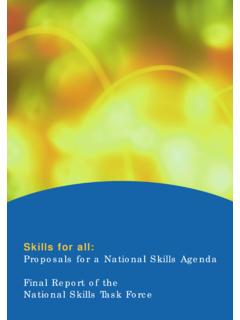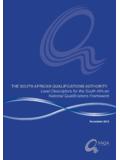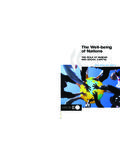Transcription of The preparation of this report by the Expert Panel …
1 The preparation of this report by the Expert Panel on literacy and numeracy Instruction for Students With Special Education Needs was financially supported by the Ontario Ministry of Education. The Expert Panel was made up of educators and researchers. This report reflects the views and opinions of the Panel members, and does not necessarily reflect the views, opinions, and policies of the Ministry of Education. Education for All The report of the Expert Panel on literacy and numeracy Instruction for Students With Special Education Needs, Kindergarten to Grade 6. 2005. The Expert Panel on literacy and numeracy Instruction for Students With Special Education Needs wishes to express its gratitude to the staff of the Special Education Policy and Programs Branch of the Ministry of Education for their administrative support during the preparation of this report .
2 The members of the Expert Panel extend their thanks to the Minister's Advisory Council on Special Education (MACSE) for suggesting the creation of an Expert Panel to present this report on literacy and numeracy components for students with special education needs. Contents 1 INTRODUCTION .. 1. About This report .. 1. Historical Context .. 1. Today's Context .. 2. French-Language Education .. 3. What We Believe .. 4. How to Use This report .. 5. Expert Panel on literacy and numeracy Instruction for Students With Special Education Needs .. 5. 2 PLANNING FOR INCLUSION: UNIVERSAL DESIGN FOR LEARNING AND. DIFFERENTIATED INSTRUCTION.
3 9. Universal Design for Learning (UDL) .. 10. Core Concepts .. 11. How to Use UDL to Plan Your Teaching .. 12. Differentiated Instruction .. 14. Planning for Inclusion .. 16. 3 ASSESSMENT AND EVALUATION OF STUDENTS WITH SPECIAL. EDUCATION NEEDS .. 19. Purposes of Assessment .. 22. The Process of Assessing .. 22. Approaches to Assessment .. 22. Types of Assessments .. 23. Assessment in the Classroom .. 24. Teacher Conferences .. 26. The In-School Support Team .. 27. Une publication quivalente est disponible en fran ais sous le titre suivant : Le rapport de la Table ronde des experts pour l'ensignement en mati re de litt ratie et de num ratie pour les l ves ayant des besoins particuliers de la maternelle la 6 e ann e.
4 This publication is available on the Ministry of Education's website, at iii The Out-of-School Support Team .. 27. The Psycho-educational report .. 28. Reassessment .. 28. 4 DEVELOPING LEARNING PROFILES: KNOW YOUR STUDENTS .. 31. Why Develop a Class Profile? .. 32. Critical Steps in the Development of a Class Profile .. 32. Why Develop an Individual Learning Profile? .. 34. Steps in Creating an Individual Learning Profile .. 34. Relationship Between Inattention and Academic Achievement .. 36. Using a Psycho-educational Assessment to Develop an Individual Learning Profile .. 37. Appendix 4-1. Class Profile Templates.
5 43. Appendix 4-2. Individual Learning Profile Templates .. 48. 5 PROFESSIONAL LEARNING COMMUNITIES .. 53. The Nature of Professional Learning Communities .. 54. Why Promote Professional Learning Communities? .. 55. Creating a Culture Favourable to a Professional Learning Community .. 56. Suggestions for Getting Started .. 57. The Role of the Principal .. 57. 6 RESEARCH TO PRACTICE: WHAT WORKS FOR BOTH literacy . AND numeracy .. 59. The Importance of Basing Instruction on Evidence-based Instructional Practices .. 59. The Tiered Approach to Early Identification and Intervention .. 60. Essential Instructional Components for Both literacy and numeracy .
6 61. Specific Instructional Strategies Supported by Research .. 62. Concrete Instructional Tools That Support Student Learning .. 67. Involving Students in the Learning Process .. 68. Providing Comprehensive Instruction That Focuses Specifically on Weak Academic Skills .. 70. 7 EFFECTIVE INSTRUCTIONAL APPROACHES AND TEACHING STRATEGIES. FOR numeracy .. 71. Guiding Principles .. 71. An Effective Mathematics Learning Environment .. 75. The Importance of Teaching Through Problem Solving .. 77. Instructional Approaches .. 80. Communication and Mathematics Learning .. 85. iv Education for All 8 EFFECTIVE INSTRUCTIONAL APPROACHES AND TEACHING STRATEGIES.
7 FOR literacy .. 91. Guiding Principles .. 92. Oral Communication .. 94. Reading .. 97. Writing .. 106. 9 ORGANIZATION AND MANAGEMENT .. 113. Shared Responsibilities for Inclusive Education .. 113. Creating a Positive Learning Environment .. 115. Organizing and Managing Instructional Variables .. 116. Accommodations and/or Modifications .. 117. Time Management .. 123. Use of Human Resources .. 125. 10 COMPUTER-BASED ASSISTIVE TECHNOLOGY .. 127. Tools to Help All Students Learn More Effectively .. 128. How Assistive Technology Can Benefit Students .. 129. Specific Benefits for literacy and numeracy .. 129. Limitations of Assistive Technology.
8 129. Assistive Technology Tools to Support Students With Special Needs in Reading .. 130. Assistive Technology Tools to Support Students With Special Needs in Writing .. 131. Assistive Technology Tools to Support Students With numeracy Challenges .. 135. Assistive Technology Tools to Support Students With Language Challenges .. 136. Assistive Technology Tools to Support Students With Sensory Challenges .. 136. Assessing the Quality of Assistive Technology Tools .. 137. Where We Go From Here .. 138. 11 PROFESSIONAL DEVELOPMENT .. 139. Key Characteristics of Professional Development .. 140. Maximizing literacy and numeracy Instruction.
9 141. Professional Development Models and Formats .. 143. 12 RECOMMENDATIONS .. 145. REFERENCES .. 149. Contents v 1 Introduction About This report The Ministry of Education established the Expert Panel on literacy and numeracy Instruction for Students With Special Education Needs to recommend practices, based on research, that would allow Ontario's teachers to improve and reinforce effective instruction of reading, writing, oral communication, and mathematics to students from Kindergarten to Grade 6. who have special education needs. Education for All: The report of the Expert Panel on literacy and numeracy Instruction for Students With Special Education Needs, Kindergarten to Grade 6 was built on a powerful foundation.
10 Ontario's ambitious province-wide process of consultation and professional learning on literacy and numeracy . The Expert Panel is deeply indebted to the groundwork of its predecessor panels. Early Reading Strategy: The report of the Expert Panel on Early Reading in Ontario and Early Math Strategy: The report of the Expert Panel on Early Math in Ontario were released in 2003; literacy for Learning: The report of the Expert Panel on literacy in Grades 4 to 6 in Ontario and Teaching and Learning Mathematics: The report of the Expert Panel on Mathematics in Grades 4 to 6 in Ontario were released in 2004. Historical Context Special education in Ontario has evolved in the context of a broad social movement advocating the closure of residential institutions, which had housed many persons with special needs, and the inclusion of these persons, with appropriate support services, as fully as possible, in the life of the community.










